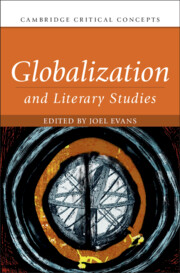Book contents
- Globalization and Literary Studies
- Cambridge Critical Concepts
- Globalization and Literary Studies
- Copyright page
- Contents
- Figures
- Tables
- Contributors
- Acknowledgements
- Introduction
- Part I Origins
- Part II Development
- Chapter 6 Joseph Conrad, the Global and the Sea
- Chapter 7 Mutual Equality
- Chapter 8 Edward Said
- Chapter 9 The New McWorld Order
- Chapter 10 Pharmakon, Difference and the Arche-Digital
- Chapter 11 Time–Space Compression
- Chapter 12 The Matter of Blackness in World Literature
- Chapter 13 World-Systems, Literature and Geoculture
- Chapter 14 World Author
- Part III Application
- References
- Index
Chapter 12 - The Matter of Blackness in World Literature
from Part II - Development
Published online by Cambridge University Press: 01 April 2022
- Globalization and Literary Studies
- Cambridge Critical Concepts
- Globalization and Literary Studies
- Copyright page
- Contents
- Figures
- Tables
- Contributors
- Acknowledgements
- Introduction
- Part I Origins
- Part II Development
- Chapter 6 Joseph Conrad, the Global and the Sea
- Chapter 7 Mutual Equality
- Chapter 8 Edward Said
- Chapter 9 The New McWorld Order
- Chapter 10 Pharmakon, Difference and the Arche-Digital
- Chapter 11 Time–Space Compression
- Chapter 12 The Matter of Blackness in World Literature
- Chapter 13 World-Systems, Literature and Geoculture
- Chapter 14 World Author
- Part III Application
- References
- Index
Summary
Building on Achille Mbembe’s A Critique of Black Reason and Paul Gilroy’s The Black Atlantic, emerging respectively from a francophone and anglophone tradition of Black critique, this chapter focuses on the profound importance of Blackness in the history of globalisation. Both writers argue Blackness needs to be understood in ‘worlded’ terms, with transnational dimensions and local inscriptions, and an emphasis on the interrelatedness of the world – its ‘systematic’ character. Moreover, each recognizes that in its engagement with imperialism, racialization, and the radical redefinition of subjectivity effected by capitalist modernity, Black writing pre-emptively grasps the spirit of globalization. As with the ‘one and unequal’ world literary system, Blackness shares a common basis in European colonialism and transatlantic slavery, but is also uneven, context-specific and immensely mutable, prohibiting any ‘total’ comprehension. Distilling a complex history into certain key topic areas, the chapter examines the significant international dimension of Black literary movements; the worlded and anti-colonial articulations of Blackness found in Négritude and the writing of Frantz Fanon; shifting Blackness in a neoliberal global order; and the afterlife and representational challenges of the foundational ‘world-system’ of slavery.
Keywords
- Type
- Chapter
- Information
- Globalization and Literary Studies , pp. 195 - 209Publisher: Cambridge University PressPrint publication year: 2022

